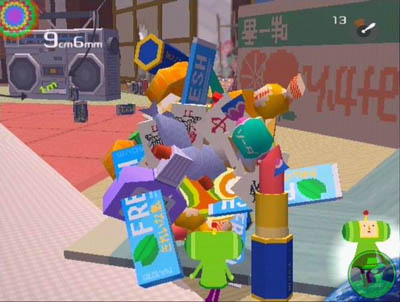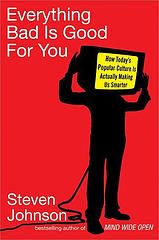Folks, enjoying the discussion here. I had a couple of responses to several points that have been raised.
1. The title. I think some of you are taking it a little too seriously — it’s meant to be funny, not a strict statement of my thesis. Calling it hyperbolic or misleading is like criticizing Neil Postman for calling his book “Amusing Ourselves To Death” when no one actually *died* from watching too much television in the early eighties.
2. IQ. As I say in the book, we don’t really know if the increased complexity of the culture is partially behind the Flynn Effect, though I suspect it is (and Flynn, for what it’s worth, suspects it is as well.) But I’m not just interested in IQ as a measure of the increased intelligence of the gaming/net generation. I focused on that because it was the one area where there was actually some good data, in the sense that we definitely know that IQ scores are rising. But I suspect that there are many other — potentially more important — ways in which we’re getting smarter as well, most of which we don’t test for. Probably the most important is what we sometimes call system thinking: analyzing a complex system with multiple interacting variables changing over time. IQ scores don’t track this skill at all, but it’s precisely the sort of thing you get extremely good at if you play a lot of SimCity-like games. It is not a trivial form of intelligence at all — it’s precisely the *lack* of skill at this kind of thinking that makes it hard for people to intuitively understand things like ecosystems or complex social problems.
3. The focus of the book itself. People seem to have a hard time accepting the fact that I really do think the content/values discussion about pop culture has its merits. I just chose to write a book that would focus on another angle, since it was an angle that was chronically ignored in the discussion of pop culture (or chronically misunderstood.) Everything Bad is not a unified field theory of pop culture; it’s an attempt to look at one specific facet of the culture from a fresh perspective. If Bob (and others) end up responding by saying that the culture is both making us smarter on a cognitive level, but less wise on a social/historical level (because of the materialism, etc) that’s a perfectly reasonable position to take, one that doesn’t contradict anything I’m saying in the book. I happen to think that — despite that limited perspective — the Sleeper Curve hypothesis was worthy of a book because 1) increased cognitive complexity is hardly a trivial development, and 2) everyone seemed to think that the exact opposite was happening, that the culture was dumbing us all down. In a way, I wrote the book to encourage people to spend their time worrying about real problems — instead of holding congressional hearings to decide if videogames were damaging the youth of American, maybe they could focus on, you know, poverty or global warming or untangling the Iraq mess.
As far as the materialistic values question goes, I think it’s worth pointing out that the most significant challenge to the capitalist/private property model to come along in generations has emerged precisely out of the gaming/geek community: open source software, gift economy sharing, wikipedia, peer-to-peer file sharing, etc. If you’re looking for evidence of people using their minds to imagine alternatives to the dominant economic structures of their time, you’ll find far more experiments in this direction coming out of today’s pop culture than you would have in the pop culture of the late seventies or eighties. Thanks to their immersion this networked culture, the “kids today” are much more likely to embrace collective projects that operate outside the traditional channels of commercial ownership. They’re also much more likely to think of themselves as producers of media, sharing things for the love of it, than the passive TV generation that Postman chronicled. There’s still plenty of mindless materialism out there, of course, but I think the trend is a positive one.
Steven
Category Archives: video_games
some thoughts on katamari damacy:everything bad is good for you, part 3.5
Responding to Bob’s “games provide much more than a cognitive workout”…
Growing up in the 80s, video games were much less sophisticated and probably less effective as a matrix for training consumption. TV performed that role. I remember watching on Nickelodeon competitions between children in a toy store in which each contestant had 60, or 120 seconds to fill a shopping cart with as many toys as they possibly could. The winner — whoever had managed to grab the most — got to keep the contents of their cart. The physical challenge of the game was obvious. You could even argue that it presented a cognitive challenge insofar as you had to strategize the most effective pattern through the aisles, balancing the desirability of toys with their geometric propensity to fly off the shelves quickly. But did that excuse the game ethically?
I’ve played a bit of Katamari lately and have enjoyed it. It’s a world charged with static electricity, everything sticks. Each object has been lovingly rendered in its peculiarity and stubbornness. If your katamari picks up something long and narrow, say, a #2 pencil, and attaches to it in such a way that it sticks out far from the clump, it will impede your movement. Each time the pencil hits the ground, you have to kind of pole vault the entire ball. It’s not hard to see how the game trains visual puzzle-solving skills, sensitivity to shape, spatial relationships (at least virtual ones), etc.
That being said, I agree with Bob and Rylish that there is an internal economy at work here that teaches children to be consumers. A deep acquisition anxiety runs through the game, bringing to mind another Japanese pop phenom: Pokémon. Pokémon (called “Pocket Monsters” in Japan) always struck me as particularly insidious, far more predatory than anything I grew up with, because its whole narrative universe is based on consumption. “Collect ’em all” is not just the marketing slogan for spinoff products, but the very essence of the game itself. The advertising is totally integrated with the story. Here’s Wikipedia (not a bad source for things like this) on how it works:
“The Pokémon games are role-playing games with a strategy element which allow players to catch, collect, and train pets with various abilities, and battle them against each other to build their strength and evolve them into more powerful Pokémon. Pokémon battles are based on the non-lethal Eastern sport of fighting insects, but the Pokémon never bleed or die, only faint. The game’s catchphrase used to be “Gotta catch ’em all!”, although now it is no longer officially used.”
Similarly, the Katamari backstory involves the lord of the universe getting drunk one night and shattering the solar system. Each level of the game is the reassembly of a star or planet. If you succeed, a heavenly body is restored to the firmament.

After an hour playing Katamari, having traversed a number of wildly imaginative landscapes (and having absorbed a soundtrack that can only be described as Japanese chipmunks on nitrous) I re-enter the actual world in a mildly fevered state. The cardinal rule in the game is that to succeed I must devour as much as possible. No time is afforded to savor the strange, psychedelic topography, to examine the wonderful array of objects (everything from thumbtacks to blue whales) scattered about in my path. Each stage is a terrain that must be gobbled up, emptied. A throbbing orb of light in the upper left corner of the screen, set within concentric rings representing target diameters, measures my progress toward the goal: a katamari “n” meters in size. The clock in the upper right corner pressures me to keep rolling.
Video games today may not be as blatant as the consumerist spectacle of the Nickelodeon game, and they may provide richly textured worlds posing greater problem-solving challenges than any electronic media that has preceded them. But it seems to me that many of them do not differ ideologically from that shopping cart contest.
“everything bad is good for you” is really bad
just finished the second book discussion at the institute. first was neil postman’s building a bridge to the eighteenth century. second was steve johnson’s everything bad is good for you in which johnson presents a contemporary refutation of postman.
 johnson’s basic premise seems harmless enough. games and tv drama are getting more layered, more complex. the mental exercise is likely making our brains more nimble, might even be improving our problem-solving skills. OK…
johnson’s basic premise seems harmless enough. games and tv drama are getting more layered, more complex. the mental exercise is likely making our brains more nimble, might even be improving our problem-solving skills. OK…
but how can you define good and bad simply in terms of whether one’s brain is better at multi-tasking and problem-solving. i’ll grant that this shift in raw brain power might make us more effective worker bees for our techno-capitalist society, but it doesn’t mean that the substance of our lives or the social fabric is improved.
we don’t need cheerleaders telling us everything is fine — especially when in our gut we’re pretty sure it isn’t. we need to look long and hard at the kind of world we are building with all this technology.
johnson’s book has been widely praised, making it all the more important to hold it up to careful scrutiny. over the next several days we’re going to launch a serious critique of “everything bad is good for you.” please feel encouraged to join in.
